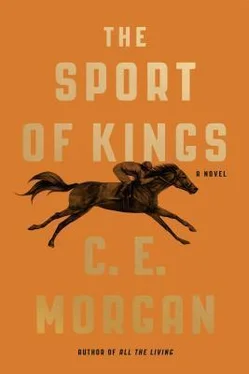Vet school at Cornell had solidified her character as much as it had her understanding of anatomy and chemistry. She wasn’t stoic by nature or tough, couldn’t joke about awful things to lighten a room the way men so often did to blunt their feelings, and everything from dissection to pinching her first foal had moved and frightened her to the limits of her endurance. But she loved animals, and she’d learned another secret from growing up around her brothers: jump in first; the water’s only cold for a few seconds. She had done just that, immersing herself in experience and developing a calm appended of self-assurance, which made her the envy of everyone she worked with. She was the clearest thinker, the quickest diagnostician, the steadiest hand, the eye in any veterinary storm. And if anyone had asked her the secret to her success, it was simple: feel your fear but don’t give it any undue respect.
Breathe and be awake.
Forge Run Farm spread darkly before her now as she parked her F250 under the coping of the broodmare barn. Like a muted invitation, yellow light seeped from the door and window fittings. She slipped between the sliding doors with a cursory “I’m here,” shedding her green Carhartt jacket and scrubbing up to the biceps at the work sink, while the Forge girl was managing Seconds Flat. The mare had backed her rump against the stall wall, and Lou was about to warn them when she saw how Henry Forge stood at the girl’s side, marginally too close, one hand on the neck of the agitated horse and one low on his daughter’s opposite hip, so they were touching ankle to shoulder like a sewn seam.
Lou turned back to the sink, startled, and gazed down unseeing as the water rushed over her cracked and weathered hands. She blinked a half dozen times. She only turned again when she heard — or felt — Henry’s approach. His face, a face so beautiful it was made for movies, was taut with worry and fatigue. He said, “Her water bag broke as you were driving over. She had three hard contractions and then nothing. We got her up, and we’ve kept her there.”
Now this was something other than mere agitation, this was not a pregnancy gone too long, this was indeed a reason to hurry. Lou darted past Henry, the moment of that strange touch already forgotten, angling toward the stall where the oak partition had been removed for the foaling. There, the musky bloom of animal odor was cut by the astringency of antiseptic. Without apology or explanation, Lou took hold of the headstall from Henrietta and drew the mare forward into the space away from the wall that could interrupt the extension of a tiny foreleg.
“Bring that foal out at any cost,” Henry said from beyond the other side of the stall. “I’d rather lose the mare than the foal.”
Lou’s brow wrinkled: a foal is not a dividend. If you need a durable investment, get a dog or a cow. A horse, like a cat, is delicate. A horse is just four legs and a will to die.
Breathe.
Seconds Flat came forward, febrile sweat beading where her stomach bossed out, kicking up a bit with her front legs at her own foundering labor. With a gentle and confident touch that belied the race against time and dwindling oxygen, Lou drew the massive dam down onto her stout belly, then rolled her onto her side, so her legs stiffed out in a porcine manner. A moment later, Lou was crouched at the rear of the horse, drawing the wrapped tail aside and reaching in past the vulvar lips. There she felt the slippery gray sac that contained the foal. The problem was immediately apparent and simple — well, simple if the foal was still alive — the leading hoof was wedged tight like a support beam against the roof of the birth canal. With care, Lou slit the opalescent sac with her gear scissors, then cupped that sharp little hoof with her hand and waited. There was the briefest of pauses, then an involuntary movement as the leg realigned itself, then a contraction pressed in from all sides, wringing the foal so it inched forward. It was clear now it was still alive, but Lou reported nothing from the deep privacy of concentration. When the bony nose appeared, she curled the sac away from the nostril. A healthy little blue tongue protruded. Another contraction and the foal slid forward, wet and dark with a marmoreal gleam, its sculpted head draped down motionless into the straw, fluid streaming from the nostrils. No one dared breathe until it jerked once and inhaled raggedly. Lou continued to roll back the sac until the foal was free — discrete, sound, and separated from its mother save for the long, pulsing rope of umbilical cord.
While Seconds Flat remained prone, the filly blinked and pawed forward, struggling to acclimate to the pungent, chilly world of the barn. She gathered her spindly legs, situating them beneath her girth, and sloped up to a stand, her surprised hind legs following unsteadily on her fore. After an awkward, lurching step, she discovered her balance and stood before them.
All around, sharp indrawn breaths.
Even with moony newborn eyes and soaked with amniotic fluid, the stark, crystalline beauty of the animal was clear. She had a fine head with a sharply dished nose and an intelligent, curious face. A coat of miscegenated depth, neither black nor brown with a white marking between her eyes — not a star, almost an aborted stripe, a slash of white like a fissure. Her new body was large and muscular for a foal, the legs straight and strong and full of run. On each pastern a skinny low sock was visible, a mere striping of white above the coronet, so her hooves appeared rimed with ice. She observed them with preternaturally alert eyes.
“My God,” said Henry, startled. “She’s gorgeous.”
He reached over then and touched the small of his daughter’s back — that too-intimate touch again. Lou saw it from the corner of her eye, but only stared down hard at the foal, a sense of unease rising like gall, but she reminded herself that the intimacy of other families was not something she understood, their lives so separate they might as well be distinct species. Her own family was something of a black Irish carnival. I do not understand what I do not understand. It was a thing she often said when her husband was itching for a fight. It irritated him to no end, but it was the truest thing she could say. Lou, how can you reconcile eating meat with all your veterinary work? I love animals and I love myself, but I didn’t invent the circle of life. I do not understand what I do not understand. Lou, how can you trust your husband since he’s an ex-addict — aren’t you always worried about a relapse? I love my husband and that’s that. I do not understand what I do not understand. Lou, how can you spend so much time around Dad, that pain-in-the-ass son of a bitch never shuts up! I love Dad. If I didn’t talk to assholes, there’d be no one left to talk to. I do not understand what I do not understand.
From a conserve of strength always remarkable in an animal after parturition, Seconds Flat was rising, the placenta ejecting in a stringing mass down onto the straw, that draped gray membrane inlaid with calcareous white strands. Intact and breathing well with the process of ejection complete, her life would return to normal soon. Lou planned to give the new mother a week of involution and repair before her first postnatal uterine exam. But for now her work here was done and, and with a disquiet urging her on, Lou was eager to get off Forge land.
She shrugged into her coat and slipped out the door with only the quietest goodbye, then paused in the emergent morning when she saw a black man walking a mare across the brick chip lane about fifty feet away. Surprise arrested her movement. In her entire life — forty-three years — she’d never seen a black person on these premises — never a farrier, never a visiting groom, certainly not a Forge employee. She was staring openly when Henrietta strode purposefully from the barn, headed in the direction of that man. She nearly ran into Lou.
Читать дальше
Конец ознакомительного отрывка
Купить книгу












